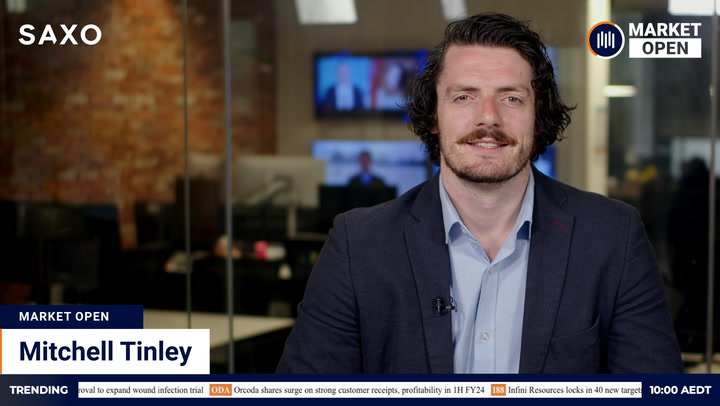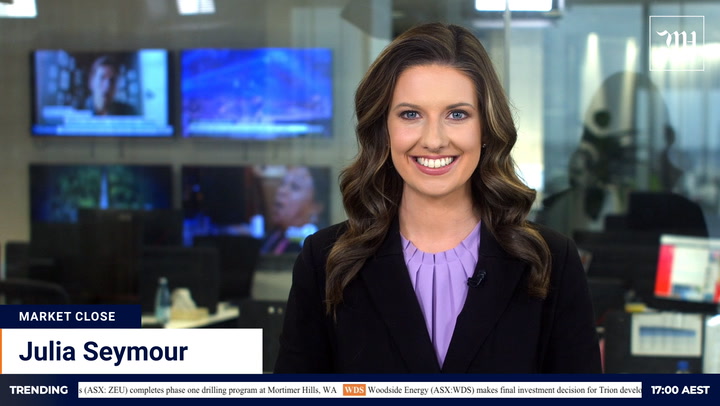The share market ended its worst two-week run since the early days of the pandemic at a 19-month closing low as fears of a global recession drove selling.
The S&P/ASX 200 ended 116 points or 1.76 per cent weaker this afternoon at 6475 after falling as low as 6410.
Mining and tech stocks spearheaded another downleg after severe falls in the US overnight. A succession of market heavyweights hit 52-week lows. Gold miners and consumer staples provided havens.
What moved the market
Two weeks of extreme selling have knocked the Australian benchmark down 764 points or almost 10.6 per cent. The past two weeks have been the worst since the initial pandemic sell-off in February-March 2020.
Pessimism about the economic outlook has soared over the last few weeks as central banks jack up interest rates to tackle the scourge of inflation. The Reserve Bank increased the cash rate target last week by the largest amount in 22 years.
The US Federal Reserve went even harder, hiking the federal funds rate on Wednesday by 75 basis points for the first time since 1994. Central banks in Britain, Switzerland and Taiwan also raised this week.
Two out of every five stocks on the ASX 200 traded at a 52-week low today, CommSec noted. Among them were some of the market’s largest companies, including Commonwealth Bank, Westpac, ANZ and Woolworths.
Banks have been amongst the biggest losers amid speculation about a wave of bad debts as soaring interest rates trigger mortgage defaults and business failures.
The tech sector has lost 49 per cent of its value since November as analysts discount the value of future earnings to reflect the increased cost of borrowing. The major miners declined today as Chinese iron ore prices fell for a sixth session.
Opinions vary widely as to how deep the current market retrace will run. Kunal Sawhney, chief executive of research group Kalkine, said capital preservation was key but value would start to emerge.
“In the current scenario, investors can look at preserving their capital and deploy it gradually over the coming days till a sustained bottom is in place. While stocks may fall further, investors may also look at buying high-quality undervalued stocks as it is difficult to predict the exact bottom,” Sawhney said.
A more bearish view came from the chief economist of ACY Securities. Clifford Bennett believes there is plenty more downside ahead if the US falls into recession.
“My view, since the start of the year, was that we will have a 6-18 month correction period, but we should all be very aware of the possibility that this is in fact a major quantum 3-6 year stock market collapse,” Bennett said.
“If this is the case, the total decline for the US stock market is more likely to be close to 50%. Perhaps 60%. Leaving a lot of room to fall still from current levels.”
Overnight, the S&P 500 plunged 3.25 per cent, erasing Wednesday’s gains and quite a bit more. The Dow sank 2.42 per cent. The Nasdaq gave up 4.08 per cent. The tech index has lost more than a third of its value since last year’s peak.
Winners’ circle
Gold has disappointed many during the market downturn as investors favoured the perceived security of the US dollar over precious metals. However, the industry outperformed this session as a retreat in the greenback lowered prices for buyers using other currencies.
Gold miners filled most of the slots near the top of the index. Silver Lake Resources gained 6.21 per cent, St Barbara 6.14 per cent and Ramelius Resources 5.7 per cent. Evolution Mining tacked on 5.43 per cent, Northern Star 5.13 per cent and industry giant Newcrest 3.72 per cent.
Bargain-hunters took advantage of the early pressure to scoop up payments companies. EML Payments bounced 9.43 per cent. Zip Co put on 6.93 per cent. Carsales.com was another strong riser, adding 8.08 per cent.
Bubs Australia, one of the big winners from an infant formula shortage in the US, rallied 9.09 per cent after upgrading market guidance. The dairy company now expects full-year underlying earnings to be at least double previous guidance of $1.2 million.
The news helped lift rival A2 Milk 4.24 per cent. Australian Dairy Group eased 1.43 per cent.
Link Administration rebounded 1.49 per cent after reaffirming full-year guidance.
Doghouse
Rate-sensitive tech stocks continued to lead the selling. Afterpay parent Block dropped 7.79 per cent. Xero shed 5.56 per cent.
Miners retreated as concerns about China’s zero-Covid policy depressed commodity prices. Whitehaven Coal lost 6.19 per cent. South32 slid 5.88 per cent, Champion Iron 5.93 per cent and OZ Minerals 5.65 per cent.
At the heavyweight end of the market, Fortescue Metals declined 5.25 per cent, Rio Tinto 4.2 per cent and BHP 3.39 per cent. The big four banks gave up between 0.7 and 3.55 per cent. Mortgage broker Genworth dropped 4.18 per cent.
A profit downgrade smashed GUD Holdings down 19.56 per cent. The car parts supplier said service to new vehicles slowed significantly since April. The firm now expects full-year underlying earnings of $147 million, down from previous guidance of $155-$160 million.
Humm Group sank 21.74 per cent after plans to sell its consumer business to Latitude Financial fell through. The companies agreed to terminate negotiations, citing “the current major disruption in financial markets”. Latitude shares were flat.
Today’s prices made grim reading for investors in some of the pandemic’s biggest winners. Shares in food delivery service Marley Spoon that traded as high as $3.80 in 2020 fell 13.33 per cent this morning to 19.5 cents.
Shares in online furniture retailer Temple & Webster were 78 per cent below last year’s $15 peak at $3.20. Stock in crowdsourcing marketplace Freelancer that traded at $1.38 a year ago was on offer today at 24 cents.
Other markets
Chinese stocks continued to ignore pressure on other markets. The Shanghai Composite advanced 0.8 per cent. Hong Kong’s Hang Seng added 1.1 per cent.
The Asia Dow shed 1.41 per cent. In Japan, the Nikkei 225 index dropped 1.67 per cent after the Bank of Japan left rates unchanged.
US futures rebounded. S&P 500 futures climbed 30 points or 0.82 per cent.
Oil gave back a little of last night’s bounce. Brent crude declined 15 US cents or 0.13 per cent to US$119.66 a barrel.
Gold also pared its advance, easing US$1 or 0.05 per cent to US$1,848.90 an ounce.
The dollar retreated 0.3 per cent to 70.18 US cents.





